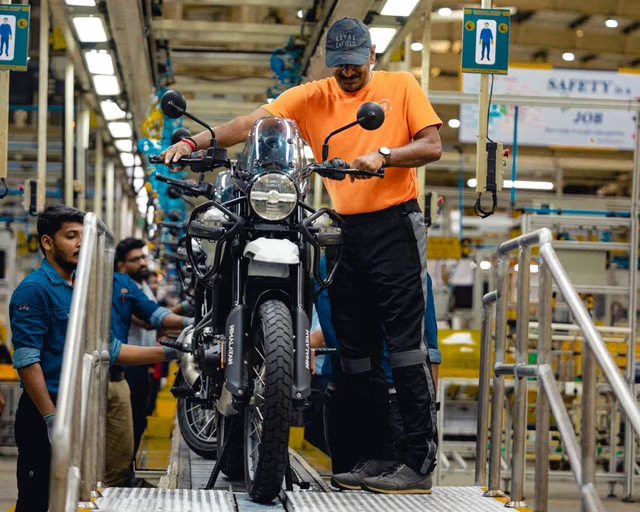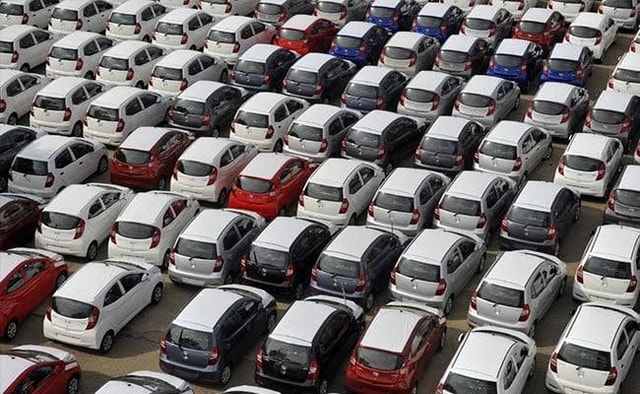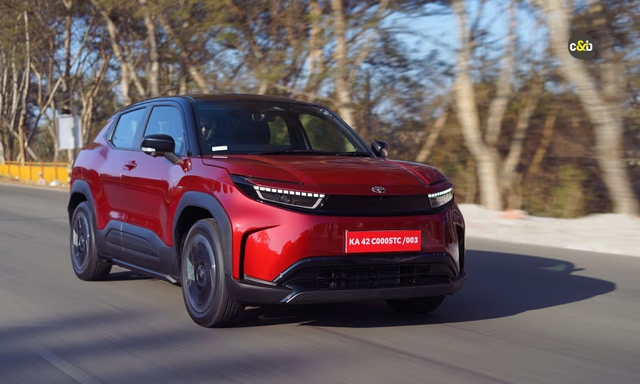As China Plans New Rules, Global Automakers Move To Store Car Data Locally

BMW, Daimler and Ford have set up facilities in China to store data generated by their cars locally, they told Reuters, as automakers come under growing pressure in the world's biggest car market over how they handle information from vehicles.
Cars are being fitted with an ever-increasing array of sensors and cameras to assist drivers.
But the data they generate can also be used by manufacturers to help develop new technologies, such as autonomous driving systems, raising privacy and security concerns, particularly when the information might be sent abroad.
U.S. electric carmaker Tesla is under public scrutiny in China over its storage and handling of customer data in the country.

Daimler said it runs a dedicated vehicle backend in China, where vehicle data is stored.
Last week, Reuters reported that staff at some Chinese government offices were told not to park their Tesla cars inside government compounds due to security concerns over vehicle cameras, according to two people with knowledge of the matter.
Also Read: Tesla Developing Platform To Allow Car Owners In China Data Access
Tesla said on Tuesday it had set up a site in China to store data generated by all vehicles it sells in the country.
Other automakers told Reuters they have done the same.
Ford Motor said it established a data center in China in the first half of last year and was storing all vehicle data locally.
BMW said it operates "local data centers in China for the Chinese vehicle fleet," without saying when they opened.
Daimler said it runs "a dedicated vehicle backend in China, where vehicle data is stored."
General Motors and Toyota Motor Corp declined to discuss how they manage their data in China, while France's Renault said it does not yet have a car data center in China.
Nissan Motor and Stellantis said they would comply with rules in China but gave no further details.
Volkswagen said compliance with data protection rules was crucial for a successful digital transformation, but "as the regulatory environment is still in rapid development, it is too early for us to comment on the specifics."
None of the carmakers said whether they would share data from China with their overseas offices.
Honda Motor Co and Hyundai Motor Co did not respond to requests for comment.
China introduced a cybersecurity law in 2017 that required all companies to store key locally-generated data onshore in China, but that was before "smart" cars made the issue a major concern for carmakers.
This month, China's cyberspace regulator posted a draft rule that said automakers must seek customer approval to collect driving data. The rule, in the public consultation phase, would also require automakers to store data locally and get regulatory permission when they want to send such data to foreign entities.

Ford Motor said it established a data center in China in the first half of last year and was storing all vehicle data locally.
In the wake of the 2017 cybersecurity law, the new proposals shouldn't be a surprise to any automakers, said Tu Le, an analyst at China-based research firm Sino Auto Insights who was critical of manufacturers that have been slow to adapt.
"The lack of a 'data' strategy tells me that decision-making is still centralized at their home offices and that they're still struggling to evolve into 'digital' first companies," Le said.
The European Union's General Data Protection Regulation also sets strict rules on how companies handle and store data.
It is unclear what impact China's requirements will have on the way global automakers research and develop new models or technologies. It is not unusual for companies currently to share data from China to their headquarters to develop models, executives at various manufacturers said.
"Data will ultimately be the difference-maker for companies because that's what they'll use to build products and services that help differentiate themselves from their competitors," Le said.
Latest News
 car&bike Team | Feb 11, 2026Royal Enfield To Boost Annual Production Capacity To 20 Lakh MotorcyclesRoyal Enfield plans a major capacity expansion to meet rising demand, targeting an annual production capacity of 20 lakh motorcycles by FY2028.1 min read
car&bike Team | Feb 11, 2026Royal Enfield To Boost Annual Production Capacity To 20 Lakh MotorcyclesRoyal Enfield plans a major capacity expansion to meet rising demand, targeting an annual production capacity of 20 lakh motorcycles by FY2028.1 min read Jafar Rizvi | Feb 11, 2026New Mercedes-AMG GLC 53 Debuts With Six-Cylinder Engine And Drift ModeThe new GLC 53 is the first AMG SUV to come with a dedicated 'Drift Mode'.1 min read
Jafar Rizvi | Feb 11, 2026New Mercedes-AMG GLC 53 Debuts With Six-Cylinder Engine And Drift ModeThe new GLC 53 is the first AMG SUV to come with a dedicated 'Drift Mode'.1 min read Bilal Firfiray | Feb 11, 2026MIDC to WLTP: Why The Switch In Testing Cycles Matters And How It Impacts YouMinistry of Road Transport and Highways (MoRTH) has decided to switch from the MIDC test cycle to WLTP. But what’s the technicality that’s going to affect you?3 mins read
Bilal Firfiray | Feb 11, 2026MIDC to WLTP: Why The Switch In Testing Cycles Matters And How It Impacts YouMinistry of Road Transport and Highways (MoRTH) has decided to switch from the MIDC test cycle to WLTP. But what’s the technicality that’s going to affect you?3 mins read Jaiveer Mehra | Feb 11, 2026New Toyota Highlander EV Is Brand's First 3-Row Electric SUVEntering its fifth generation, the new Highlander SUV offers a range in excess of 500 km on a full charge1 min read
Jaiveer Mehra | Feb 11, 2026New Toyota Highlander EV Is Brand's First 3-Row Electric SUVEntering its fifth generation, the new Highlander SUV offers a range in excess of 500 km on a full charge1 min read Janak Sorap | Feb 10, 2026KTM 200 Duke Receives Hardware Updates; Priced at Rs 1.94 LakhThe 200 Duke now gets a larger front brake disc, lighter alloy wheels, slimmer fork setup and a fresh new livery.1 min read
Janak Sorap | Feb 10, 2026KTM 200 Duke Receives Hardware Updates; Priced at Rs 1.94 LakhThe 200 Duke now gets a larger front brake disc, lighter alloy wheels, slimmer fork setup and a fresh new livery.1 min read Bilal Firfiray | Feb 10, 2026January 2026 Auto Retail Up 17.61% YoY At 27.22 Lakh Units: FADA ReportFADA reports 17.61% YoY growth in January 2026 auto retail at 27.22 lakh units, driven by strong rural demand, two-wheeler surge and positive dealer outlook for the coming months.3 mins read
Bilal Firfiray | Feb 10, 2026January 2026 Auto Retail Up 17.61% YoY At 27.22 Lakh Units: FADA ReportFADA reports 17.61% YoY growth in January 2026 auto retail at 27.22 lakh units, driven by strong rural demand, two-wheeler surge and positive dealer outlook for the coming months.3 mins read
 Girish Karkera | Feb 11, 2026Toyota Ebella EV Review: Compact And Fun-To-Drive With The Promise Of Stress-Free AftersalesNo hiding the fact that it is a clone of the Maruti Suzuki eVitara, but the first all-electric Toyota in India is reasonably well-rounded8 mins read
Girish Karkera | Feb 11, 2026Toyota Ebella EV Review: Compact And Fun-To-Drive With The Promise Of Stress-Free AftersalesNo hiding the fact that it is a clone of the Maruti Suzuki eVitara, but the first all-electric Toyota in India is reasonably well-rounded8 mins read Bilal Firfiray | Feb 10, 2026Tata Punch EV Long Term Review: Small EV With A Big-Hearted PersonalityWith the new Punch EV Facelift just around the corner, we decided to take a look at what it excels at and what could be improved.7 mins read
Bilal Firfiray | Feb 10, 2026Tata Punch EV Long Term Review: Small EV With A Big-Hearted PersonalityWith the new Punch EV Facelift just around the corner, we decided to take a look at what it excels at and what could be improved.7 mins read Bilal Firfiray | Feb 4, 2026Volkswagen Tayron R-Line Review: Sensible Flagship For IndiaVolkswagen has introduced a made-in-India flagship SUV that offers space, comfort, performance, and German driving finesse in a practical three-row package. But is the Tayron R-Line good enough?6 mins read
Bilal Firfiray | Feb 4, 2026Volkswagen Tayron R-Line Review: Sensible Flagship For IndiaVolkswagen has introduced a made-in-India flagship SUV that offers space, comfort, performance, and German driving finesse in a practical three-row package. But is the Tayron R-Line good enough?6 mins read Preetam Bora | Feb 2, 2026TVS NTorq 150 Road Test Review: Bigger, Better & More Efficient!We test the new TVS NTorq 150 out in the real world to get a sense of what it offers in terms of performance, dynamics and fuel economy.7 mins read
Preetam Bora | Feb 2, 2026TVS NTorq 150 Road Test Review: Bigger, Better & More Efficient!We test the new TVS NTorq 150 out in the real world to get a sense of what it offers in terms of performance, dynamics and fuel economy.7 mins read Bilal Firfiray | Jan 21, 2026Tata Punch Facelift Review: New Turbo Engine; Same Old SoulWith the update, the Tata Punch facelift retains its character of being a healthy runabout, which is perfect for Indian roads. But have these changes made it any better?7 mins read
Bilal Firfiray | Jan 21, 2026Tata Punch Facelift Review: New Turbo Engine; Same Old SoulWith the update, the Tata Punch facelift retains its character of being a healthy runabout, which is perfect for Indian roads. But have these changes made it any better?7 mins read



























































































































